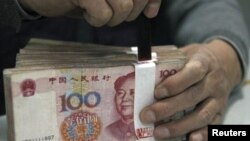At a recent conference in Washington, U.S. Under Secretary of State for Economic, Energy and Agricultural Affairs Robert Hormats posed a critical question: "Will China work within the rules-based, market-driven, international economic system created at the end of World War II, or [will China] strive to dramatically change it?"
Over the past fifteen years, China has experienced dramatic economic growth, thanks to its own reforms and the hard work of the Chinese people; but China's growth is also due to a stable global financial system, market access benefits of WTO membership and enormous capital inflows.
"We should . . . recognize the benefits of greater economic interdependence between China and the rest of the world," Under Secretary Hormats said. "The global system becomes more valuable to China as it becomes more intertwined with the fortunes of the rest of the world, and therefore [China] has a greater stake in the success of that system."
The rapid rise of China's economy and the recent global financial crisis have led some to question the validity of the Western-based international economic system. Those who pose such questions often point to the emergence of the so called "China Model" that focuses on building and strengthening state-owned and state-supported enterprises through advantages such as state financial support and regulatory benefits denied to private companies, ability to obtain intellectual property at the expense of other companies, or enable Chinese companies to obtain advantages in government procurement.
"[These practices] impact and threaten the competitiveness of American private companies, those of other countries, and even Chinese private companies," Under Secretary Hormats said. "The Chinese need to recognize that if America, or Europe, or Japan, or people in developing countries see the system as unbalanced or unfair, and believe that one country is taking undue advantage of it while failing to make appropriate contributions to its overall success, they will react in ways that threaten the system’s future and that means China’s future as well."
"While China searches for greater balance in its domestic economy and greater balance between its domestic challenges and its growing responsibility in the global system," noted Under Secretary Hormats, "it is critical that the United States and China engage in rigorous dialogue and regular engagement —- in both bilateral and multilateral settings."
U.S. & China: The Next Five Years

"The global system becomes more valuable to China as it becomes more intertwined with the fortunes of the rest of the world."



















